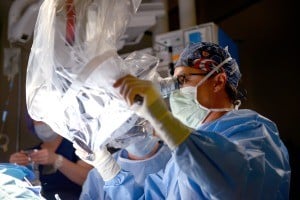An upcoming surgery can cause anxiety in patients of all ages. Cochlear implant surgery can be life-changing for a child with hearing loss, but preparing them mentally and physically for the procedure will make all the difference in their comfort level as the day approaches.
Parents also approach surgery for their child with a great deal of anxiety and concern. Preparing yourself for the surgery will also help you get your child ready for the procedure. Education goes a long way in helping both of you face surgery with a positive attitude.
Tips For Preparing Yourself and Your Child For Cochlear Implants
One of the first things to consider before your child’s cochlear implant surgery is to find a local or online support group. Pediatric cochlear implant patients and their parents and families benefit from networking to share information and encouragement as they go through the surgical process.
Support groups for cochlear implants can be found at:
- American Cochlear Implant Alliance
- Hearing Loss Association of America
- Alexander Graham Bell Association for the Deaf and Hard of Hearing
These groups will give you information through the eyes of the patient and their parents, letting you know what to expect before, during, and after the surgery.
In addition to a support group, there are additional steps you can take as a parent to prepare yourself and your child for cochlear implants:
- Maintain physical interaction. Children with substantial hearing loss cannot rely on audio cues for learning or comfort. Instead, physical interaction is the key to ensuring your child feels safe and comfortable. Holding your child and showing him positive facial expressions can help him remain calm throughout the process.
- Sing rhyming songs that involve actions. Repeat songs that rhyme and involve actions, such as hand gestures and exaggerated lip movements. By repeating the songs before the surgery, your child will know the words to the songs when they hear them after the cochlear implants are placed.
- Make hearing an everyday routine. Talk to your child like you would anyone else. They can read your gestures and can learn to communicate with you even before the cochlear implants are placed.
- Get your child vaccinated. Be sure that your child gets all of the required vaccines at least two weeks before the surgery.
- Talk to your child about the surgery. Tell your child that the surgery will improve their hearing. The staff will also help your child understand what the surgery is for and create a comfortable environment for them.
- If a tour of the hospital is available, bring your child. Seeing the facility ahead of time may help make your child feel more at ease and less nervous on the day of the surgery.
- Plan for your child’s recovery time. Make sure you have plenty of time to care for your child after surgery. This is a time when your child will need plenty of attention and care. If you have other young children, lining up additional care for them for the first few days might make it easier for you to focus on your “patient.”
- Understand the surgery. Know what the surgery entails, including the risks, benefits, and other options. Ask all the questions you need to feel confident that you understand the surgical process.
- Bring a list of medicines and natural health products that your child takes. Tell the doctor about all medicines and natural health products that your child takes. Some may increase any risks involved during surgery so your doctor will let you know if and when those medications or supplements should be stopped before the surgery.
Keep in mind your child will not be flooded with sound once the cochlear implants are in place. It will be a gradual process with the volume being increased little by little, allowing your child to slowly get used to hearing the world around them.
How Long Does it Take to Recover from Cochlear Implant Surgery?
Your child will likely be back to regular activities within about one week. The incision should heal within 2-3 weeks. At that time, your managing audiologist will turn on the cochlear implant.
How to Care for Your Child After Cochlear Implant Surgery
After cochlear implant surgery, your child is going to need plenty of care. You will also have a list of instructions from your pediatric otolaryngologist to follow to ensure your child’s recovery is as quick and comfortable as possible.
Activities
- Your child will need a few days of rest after cochlear implant surgery. Most children resume some quiet activity within 3-5 days after the procedure.
- With the doctor’s permission, your child should be able to return to school one week after cochlear implant surgery. However, your child may not participate in physical education (PE) for the first three to four weeks after the procedure. Your doctor will clear your child for physical activity based on their recovery process.
- Other physical activity will also be restricted for the first 3-4 weeks, including playing on the monkey bars, doing somersaults, or any activity that will turn your child upside down. Avoid bike riding, running, or any sports until you have the go-ahead from your child’s doctor.
Diet
- Your child can eat a regular diet when they are ready. Some children experience an upset stomach immediately following surgery and prefer a bland diet consisting of plain rice, toast, or yogurt for the first day or two.
Medicine
- Your child’s doctor will let you know when they can restart taking medicines and supplements.
- If your doctor prescribed medication for pain or antibiotics, be sure your child takes it exactly as prescribed.
- Talk to your doctor about other over-the-counter medicines to determine what is safe and what is better to avoid until recovery is complete.
Incision Care
- If your child has a bandage over the incision, it is usually removed the following day after the cochlear implant surgery.
- After the bandage is removed, wash the area daily with warm, soapy water, and pat it dry.
- Keep the area clean and dry.
Be sure to attend all follow-up appointments with your child’s doctor. Call your doctor or nurse if your child experiences any unusual side effects or you have other concerns.
Contact a Pediatric Otolaryngologist For More Information
Pediatric cochlear implants can be life-changing for a child with bilateral severe to profound hearing loss. If you are interested in learning more about these devices, contact the pediatric otolaryngologists at Pediatric ENT Associates (PENTA) at Children’s of Alabama in Birmingham today.


